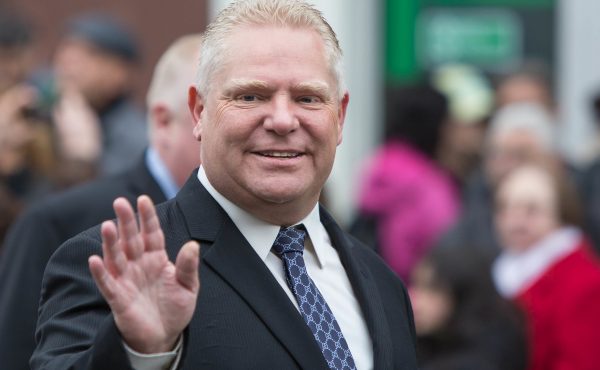
It can not be said often enough: if Mayor Rob Ford managed a large corporation the way he runs the City, his board would have turfed him ages ago.
Consider the following scenario: a company is facing a steady-as-she-goes year — no big product launches, but not major retrenchments, either. Yet the firm’s top executives know they’ve got to re-tool their prices to reflect changes in supply costs, payroll, etc. So for months, the chief financial officer spearheads a company-wide effort to make those changes as part of the planning for the next fiscal year.
The CFO, in fact, is encouraged in his or her role by the CEO, and thus has dedicated a serious amount of time to forewarning the investment community. But then, at the last moment, the CEO — without consulting anyone — calls up a reporter at the Wall Street Journal or Report On Business and gives the scribe a huge scoop: the company, the CEO says, is going to freeze its prices to win over customers, come what may. Moments after the story goes up on Dow Jones, the markets go haywire as nervous institutional investors dump stock in response to the mixed messages coming from the C-suite.
This, basically, is what happened to former budget chair Mike Del Grande last week, and he responded the way many CFOs would have: he quit. Yet Ford’s decision to vote against his own budget was not so much a non-confidence motion in Del Grande as it was a proof, if more were warranted, of his inability to do the job.
A word now about Del Grande: he was certainly not my favourite city councillor, and I’m sure I’m not the only one who had had enough of his incessant whining about council’s politics. But notwithstanding his narrow view of municipal services, Del Grande was a genuinely dedicated ally who knew his way around a balance sheet. And, moreover, he was someone who actually did all the hard work that the Fords claim to be doing but really aren’t. He should have had serial number 001 on his Ford Nation membership card. Indeed, Del Grande put so much of himself into operationalizing the mayor’s “Respect for Taxpayers” mantra that he actually made himself sick. So you have to give the guy credit for trying and for team play.
And what did he get in return for his dedication to the cause? Well, “respect” certainly isn’t the word that comes to mind. As with so many of his council supporters, as well as the voters who backed him, Ford amply demonstrated that he assigns no value to personal loyalty. Not that voting for his own budget would have been any kind of gesture to Del Grande. But the fact is Del Grande was almost always onside, and the mayor screwed him over nonetheless (and not for the first time).
The apparent dearth of potential successors is partly attributable to the rising swell of pre-by-election politicking that has replaced governing as council’s daily M.O. But you’ve got to think that for the more sentient members of council’s right wing — Paul Ainslie, Michael Thompson, Denzil Minnan-Wong, and even David Shiner — the very real prospect of being thrown under the mayor’s Escalade while doing a brutal job on his behalf is not exactly enticing.
Strictly speaking, the absence of a budget chair is not a pressing problem. Until the summer, the budget committee won’t be doing much more than vetting variance reports, which means that brother Doug can’t do much harm, and that the mayor, theoretically, has time to cut a deal.
Many people on council believe it’s all moot anyway, because either the conflict appeal decision or the looming compliance audit report into Ford’s 2010 campaign finances will finish off his mayoralty once and for all.
But it seems to me that someone should be asking, what if Ford somehow survives? What if the appeal court finds a technicality and gives Ford a pass? And what if the forensic audit process turns into a legal marathon, as seems likely?
Someone’s got to govern the city, and someone’s got to make decisions about the budget. Right now, however, council is so profoundly pre-occupied with the depth charge scenario that they’ve neglected to consider the long game. The absence of a qualified budget chair is yet another governance crisis in the life of this council.
How to find a workable solution? I’d argue in favour of the approach that council used to wrest control over the TTC last year after Gary Webster’s ouster at the hands of the Ford allies on the Commission. Under the City’s municipal code, the mayor has the authority to appoint the chairs of the standing committees. But there is no explicit language granting the mayor the power to name the budget chair.
If Ford isn’t removed from office, council will need to align itself behind a credible budget chair who has the smarts and the political capital to play a brokering role between those who want to contain spending and those who feel the city needs to extend services or commit resources to city-building initiatives.
The obvious problem with the rapidly diminishing pool of Ford allies is that someone who truly isn’t capable will end up with the job by process of elimination. The bottom of the barrel is not where we should be looking to find someone who can figure out how the city will spend close to $10 billion in 2014.
If we end up limping to the end of this mind-bogglingly strange term with Ford still in office, the members of council have an obligation to the public to install — and then support — a credible budget chair who can see the city through one more spending cycle. They can’t just stand on the sidewalk and watch the car burn.
photo by Andrew Louis





8 comments
But wait! who’s Cam Weldon in this little analogy? Hmmm? CHECKMATE, LORINC!
John,
As a professional “child” of the private sector, I want to gag every time I hear Doug Ford say “Let me tell you how it works in the private sector”
He is not representative of the private sector, let alone the very financially sophisticated American multi-national marketing giants I worked for (General Foods, Ralston Purina, PepsiCo—Pizza Hut & Taco Bell, ConAgra/Hunt-Wesson) that are orders of magnitude more financially sophisticated than Toronto, as they have 50–100$B budgets & geographically dispersed operations that require best practices in governance, management & controls.
Unlike these firms, Toronto is governed by the competing (& often dysfunctional) political interests of council & its factions, while business is totally driven by Darwinian survival in the face ruthless competitors. It only survives by making good fact-based financial decisions—as flights of fancy like the Mayor’s private sector subway funding fantasy would put them out of business.
Deco Label & Tags is a very successful private family firm operating in Toronto & Chicago, not on 6 continents, likely w $M100s sales rev that has no relevance or lessons to teach Toronto’s Budget Committee, budgeting process or $9B operating & huge capital budgets.
Last week’s 2013 Op Budget was sadly another lost opportunity for Toronto to seize more control of its own public transit destiny, by gradually increasing residential property taxes to 905 levels (TO’s are ~1/2 905), just as it is gradually reducing it’s commercial tax rates over 15 years to equalize them to 905 & avoid the flight of businesses & their jobs to the lower tax 905.
It would then be much more difficult for Queens Park & Ottawa to criticize Toronto, and deny the city cooperative Provincial/Federal transit & infrastructure funding, oblivious to Toronto, hat in hand, begging for non-existent $.
It would be a lot more realistic approach than continue waiting for the Feds (6 years & counting) Nat’l transit strategy & Metrolinx (5 year wait) for provincial transit funding strategy).
Metrolinx must shed is provincial yoke & truly govern to fulfill its mandate to fully integrate GTA transit service & fares—which they avoid like the plague! Contrary to Clr Gord Perks worry that it would represent taxation w/o representation, QP (ie. MPPs) should provide Metrolinx w capital & operating budgets & parameters, but stay out of the backroom maneuvering and political dictates the render it impotent.
Queen’s Park has effectively vetoed & hobbled Metrolinx with serial postponements of the funding strategy the political Board was calling for 9n 2008, until after the 2011 election, after the 2013 OLL race, after the expected 2013 election, etc., etc. always after, never honest discussion of painful tax increases needed for public transit/infrastructure.
But City Council doesn’t get a say over who the chair of the Budget Committee is. It’s a person the Executive Committee elects from among its own members, and that decision isn’t subject to any kind of ratification.
And even if Council replaced every member of the Budget Committee other than the chair, the committee’s recommendations would still get reported to City Council through the Executive.
@ Neville Park — Cam Weldon was the CFO on paper, but the ultimate financial decision-making has been driven by the budget committee/chair, so I’d say he’s like the controller if you want to pursue the analogy. The mayor, btw, is actually the chief executive officer of the corporation.
@Goldsbie An alternative solution?
Lorinc is correct to say that too many have jumped the gun on wishful speculation about life without Ford when it is only a 50/50 proposition but simply don’t get his histrionics about appointing a new Budget Chair. Whether Ford is there or not, a Budget Chief will be found and it isn’t as if the City hasn’t had some terrible ones in the past, just remember Jackobek. If Toronto can survive Miller’s Chief Carroll and a Budget Committee with the fiscally challenged Augimeri, Heaps, Mihevc, Perks and Rae as members, it can easily survive the next Chair.
John, if we’re playing “what if Mayor X was CEO” games then Miller would have been out faster than Ford. You can’t run massive deficits, deplete the reserves to $0, put $800 million worth of street cars on a credit card with no way to pay for it and run a 40 day garbage strike by your own employees only to cave at the end without being removed.
The reason the uncouth mayor of ours was elected in the first place was not due to his charming ways, his sense of style, his fashion sense or his intellect. Miller has all of that. What he didn’t have was the financial discipline or ability to prioritize. Finances is the ONLY reason Ford is in office. Don’t forget that.
Thankfully Mayors are not beholden to shareholders – they serve a greater purpose and have a responsibility to city building.
Rob Ford was (maybe still is) chief financial officer at the family’s business (Deco Labels & Tags), not because he was qualified for it, he didn’t even graduate university, but because he was family.
Re Doug and his private sector bullshit, see here.
And just what’s wrong with Frank DiGiorgio, anyway?